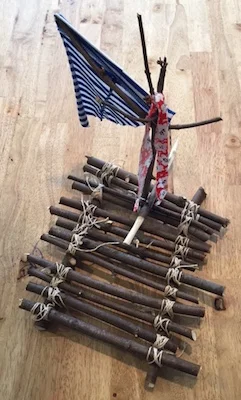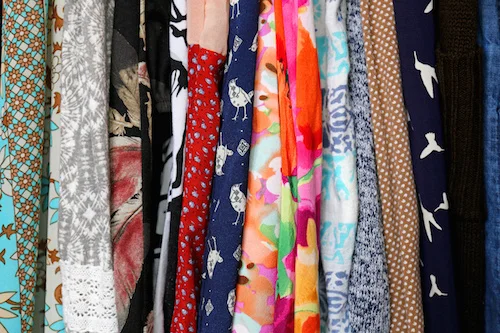Taking this pottery class was giving that back to me. I was a beginner again. I wasdoing it simply because it brought me joy. Sitting at the pottery wheel was giving me freedom and space. I’d sit and work the clay, and my mind was at rest. The wheel would spin and the clay would slide through my hands, and I could feel myself relax. It was quiet. I needed that.
All in Crafty
River of Disappointment
We never ask for disappointment, do we? It shows up uninvited like grumpy Aunt Lurleen, unexpected as a canker sore, as unwelcome as salt in a wound. It does not politely remove its hat upon entering our world, nor does it apologize. Disappointment never apologizes. Forgoing customary greetings, it barges in and sets to flooding the place. So what of it, Eric? Big deal. Grow up. Be an adult. Though indeed responses, they avoid the question: What do we do with all the disappointment? Accept it? Get on with life? Love it? Hide from it? Pull it close? Push it away? Drown in it? Grieve? Take joy in it? Capitulate?
Key of David
Advent is not only about what has happened; it is about what we still need to happen. It is about waiting, about that quiet, anticipatory, mildly uncomfortable moment before the song starts up, the lights come on, the guests arrive. Advent takes place in the dark.
Stalled by Grace
My dear Britney, I felt, take note of this: You should be quick to listen, slow to speak and slow to become angry. Not simply because it will end in less frustration and hurt feelings, but because it is how we are surprised by life, and grace, and God.
True-ing
I am no carpenter. But my doctor son, with a degree in tropical medicine, volunteers for a humanitarian agency in Burma, exercising his skills with bodies and souls. He is also a poet and artist. His hobby, and a way of calming his mind and expressing his sense of shape and beauty in the midst of suffering and destitution, is to find odd pieces of wood and fashion from them objects beautiful or useful, exposing the wood's inherent quality. Tables, chairs, bowls, spoons! He’s skilled with a scalpel, either on human bodies or on the striated muscles of something that used to be a tree.
Without knowing it, he has given me a metaphor to live by—the sizing up of my trajectory in life.
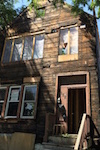 The structure underneath—the bones of the house—are good because someone we trust knows they’re good, sturdy, strong and able to be restored, and they can tell us this and we believe them. And maybe that’s what we’re after all along—someone who comes along to tell us that there is treasure here in our bones, someone who can see the intrinsic value in what others might consider a teardown.
The structure underneath—the bones of the house—are good because someone we trust knows they’re good, sturdy, strong and able to be restored, and they can tell us this and we believe them. And maybe that’s what we’re after all along—someone who comes along to tell us that there is treasure here in our bones, someone who can see the intrinsic value in what others might consider a teardown.
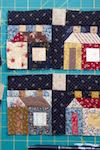 When I stitch my little felt ornaments, my fingers sometimes get sore. I take breaks and rub them, looking out the window and listening to the sermon that is streaming. “It is perhaps through the work of kind welcome and laden table and warm bed,” the pastor says, “that the church labors most effectively to bear witness to the reality of the kingdom of God and the welcome that we receive in God in Christ.” He is preaching on the book of Ruth. Ruth! I studied it so many times in college, together with girlfriends all waiting for men, for boyfriends, for husbands, trying to glean some insight from this woman who did strange things indeed to secure her man. That is not the point of the book, the preacher says. I breathe a sigh of relief. Instead, he gleans kindness, hope, hospitality from the passages. The kind of hospitality that hems in, honors, and protects everything about the person being welcomed into our lives.
When I stitch my little felt ornaments, my fingers sometimes get sore. I take breaks and rub them, looking out the window and listening to the sermon that is streaming. “It is perhaps through the work of kind welcome and laden table and warm bed,” the pastor says, “that the church labors most effectively to bear witness to the reality of the kingdom of God and the welcome that we receive in God in Christ.” He is preaching on the book of Ruth. Ruth! I studied it so many times in college, together with girlfriends all waiting for men, for boyfriends, for husbands, trying to glean some insight from this woman who did strange things indeed to secure her man. That is not the point of the book, the preacher says. I breathe a sigh of relief. Instead, he gleans kindness, hope, hospitality from the passages. The kind of hospitality that hems in, honors, and protects everything about the person being welcomed into our lives.
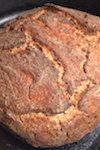 For a long time, I did not love poetry.
For a long time, I did not love poetry.
I read poetry. I memorized poetry to get me through a job that left me weary from boredom. I tried to understand poetry. But I didn't love it.
I loved words. Any words. Words in books, words in songs, words on the shampoo bottle. I loved stories — long ones, short ones, fat ones, skinny ones. I loved metaphors. I even loved select poems. But I did not love poetry.
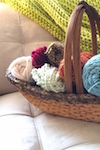 Every step merits intentionality and reevaluation. I have learned that a way to assess whether or not I have remained in rhythm while crocheting is to compare the row of stitches I have just finished to the foundational row with which I started. With every turn of the corner, I raise up the work and see if it is still in balance. If it is, I keep going. If it is not, I unravel just a few stitches back and adjust accordingly. This is how a blanket gets made, with ever-present intentionality.
Every step merits intentionality and reevaluation. I have learned that a way to assess whether or not I have remained in rhythm while crocheting is to compare the row of stitches I have just finished to the foundational row with which I started. With every turn of the corner, I raise up the work and see if it is still in balance. If it is, I keep going. If it is not, I unravel just a few stitches back and adjust accordingly. This is how a blanket gets made, with ever-present intentionality.
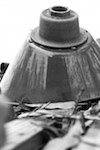 Nearly every step of the slow DIY building project was a step-by-step trial by fire for me. Though untrained and in anti-possession of any legitimate carpentry skills, the one trait I have going for me is that, though slow, I am a willing student. When someone reacts in response to seeing my now complete dwelling, You are so handy. I could never do that, my inner, if not verbal, response is, I have no idea what I am doing. If I can do this, anybody can. And I absolutely mean it.
Nearly every step of the slow DIY building project was a step-by-step trial by fire for me. Though untrained and in anti-possession of any legitimate carpentry skills, the one trait I have going for me is that, though slow, I am a willing student. When someone reacts in response to seeing my now complete dwelling, You are so handy. I could never do that, my inner, if not verbal, response is, I have no idea what I am doing. If I can do this, anybody can. And I absolutely mean it.
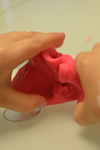 As much as motherhood has taken away — time to write, the ability to practice the piano without little hands taking over the keyboard ("Scooch, Mama”), the mental acuity to use polysyllabic words (or, some days, to finish sentences) — it has given me more. I have not lost myself in motherhood, as I had feared, but discovered myself. I don't just mean I've realized the beauty and joy of being a mother, but in and through motherhood I've grasped new ways of being creative. I learn creativity from my children, who are infinitely the same as and different from me; I learn creativity through my desire to create for them; I learn creativity simply by opening myself up to being something else.
As much as motherhood has taken away — time to write, the ability to practice the piano without little hands taking over the keyboard ("Scooch, Mama”), the mental acuity to use polysyllabic words (or, some days, to finish sentences) — it has given me more. I have not lost myself in motherhood, as I had feared, but discovered myself. I don't just mean I've realized the beauty and joy of being a mother, but in and through motherhood I've grasped new ways of being creative. I learn creativity from my children, who are infinitely the same as and different from me; I learn creativity through my desire to create for them; I learn creativity simply by opening myself up to being something else.
 My involvement is about being the guy behind the thing that says, “Pay attention to this.”
My involvement is about being the guy behind the thing that says, “Pay attention to this.”
If I can be the person that directs others to a special thing, I’m perfectly fine and I like that anonymity. That’s my own job well done.
 Writing a letter to a stranger is all about trust. To offer your thoughts and opinions, some of which you might never say out loud, is truly relationship building. But there’s also something refreshing about writing to someone who is not fully aware of your daily life, your flaws, the way you look, or how cute your children are. They get a totally different picture of things, which makes the whole thing special. Our relationship took awhile to gain traction, and it was about a year before Michelle and I got to the meat and potatoes of things. Now I feel comfortable writing to her about just about anything, including some things I might never say out loud to people in my daily life.
Writing a letter to a stranger is all about trust. To offer your thoughts and opinions, some of which you might never say out loud, is truly relationship building. But there’s also something refreshing about writing to someone who is not fully aware of your daily life, your flaws, the way you look, or how cute your children are. They get a totally different picture of things, which makes the whole thing special. Our relationship took awhile to gain traction, and it was about a year before Michelle and I got to the meat and potatoes of things. Now I feel comfortable writing to her about just about anything, including some things I might never say out loud to people in my daily life.
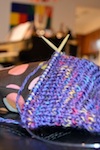 At some point, I notice an anomaly in the sweater — the consequence of knitting while watching TV. I’ve messed up the pattern, miscounted. I consider the damage. How much work would it take to undo four rows of stitches and re-knit? How noticeable is it? In the end, stitch by stitch, I remove the rows. I’ve become quite accomplished at this work of unknitting, even with complicated slipstitches, increases and cables. The piece won’t be perfect (how else would they recognize it as hand-knit?), but I want it to be beautiful.
At some point, I notice an anomaly in the sweater — the consequence of knitting while watching TV. I’ve messed up the pattern, miscounted. I consider the damage. How much work would it take to undo four rows of stitches and re-knit? How noticeable is it? In the end, stitch by stitch, I remove the rows. I’ve become quite accomplished at this work of unknitting, even with complicated slipstitches, increases and cables. The piece won’t be perfect (how else would they recognize it as hand-knit?), but I want it to be beautiful.
 Now, certainly I am grateful for the cheerful mechanic who diagnosed and replaced my broken alternator last Christmas Eve. And I owe a great deal to the tailor who salvaged the almost-brand new red leather shoes I’d spilled jojoba oil on. But that does not diminish my own satisfaction from improvising an oil plug gasket by sewing together part of a leftover ring from a battery-cleaning kit. Nor does it dim the delight of successfully building a new pad for a seatless chair frame I found on the street.
Now, certainly I am grateful for the cheerful mechanic who diagnosed and replaced my broken alternator last Christmas Eve. And I owe a great deal to the tailor who salvaged the almost-brand new red leather shoes I’d spilled jojoba oil on. But that does not diminish my own satisfaction from improvising an oil plug gasket by sewing together part of a leftover ring from a battery-cleaning kit. Nor does it dim the delight of successfully building a new pad for a seatless chair frame I found on the street. I dabble. This is partly to do with a lack of focus and, at times, plain old laziness. But sheer curiosity holds the lion’s share of this scattershot creativity. It’s not enough to enjoy a good book — I want to write good words. To drop five bucks on the counter for an artisan loaf of bread or to savor a craft brew and not experience the process is to leave something incomplete. A question remains unvoiced.
I dabble. This is partly to do with a lack of focus and, at times, plain old laziness. But sheer curiosity holds the lion’s share of this scattershot creativity. It’s not enough to enjoy a good book — I want to write good words. To drop five bucks on the counter for an artisan loaf of bread or to savor a craft brew and not experience the process is to leave something incomplete. A question remains unvoiced.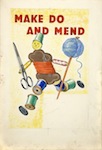 Mending is neither glamorous nor easy, but I’ve discovered it can be a calming antidote to the frantic pace of my everyday life. It requires me to stop in the middle of commitments — a day job and a marriage and freelance assignments — and commutes to focus on one small, tangible thing. There is satisfaction in threading a needle with just the right color of thread and making tiny, precise stitches to close a hole or hold a seam together. I’m always amazed by the strength of those stitches and the sense of accomplishment I feel afterward.
Mending is neither glamorous nor easy, but I’ve discovered it can be a calming antidote to the frantic pace of my everyday life. It requires me to stop in the middle of commitments — a day job and a marriage and freelance assignments — and commutes to focus on one small, tangible thing. There is satisfaction in threading a needle with just the right color of thread and making tiny, precise stitches to close a hole or hold a seam together. I’m always amazed by the strength of those stitches and the sense of accomplishment I feel afterward.Interview Series: MAKING — A Conversation with Carey Wallace
Art in all its forms is intimately connected with every aspect of all lives. We sing when people die. We dance when they get married. Even sports events and video games incorporate music, dance images, theater. The things I make are only my participation in that constant, unstoppable swirl of creation. This world is already beautiful and good. It’s just a question of where we choose to look.
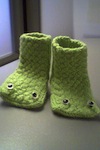 It was a revelation: With my own hands and a little patience, I could make some of the very things I’d been planning to buy — and with just as fine or a finer result. Later on would come the challenge of translating what I saw in my mind’s eye into something that could keep my neck and hands warm. For now I reveled in the discovery of this power to create.
It was a revelation: With my own hands and a little patience, I could make some of the very things I’d been planning to buy — and with just as fine or a finer result. Later on would come the challenge of translating what I saw in my mind’s eye into something that could keep my neck and hands warm. For now I reveled in the discovery of this power to create. Her note was written on an old index page of a ledger and she too adhered a bird sticker to the faded surface. She ripped the page right out of the book; I loved the spontaneous, rustic aesthetic. The postcard did in fact bear her greeting from four years ago as well as a dignified black cat on the glossy cover along with French writing — she went to Paris, too. Belated, yet thoughtful. I don’t know many people who’d realize they’d forgotten to send a postcard four years ago, then actually send it upon the moment of realization. My friends are a rare, whimsical, priceless bunch.
Her note was written on an old index page of a ledger and she too adhered a bird sticker to the faded surface. She ripped the page right out of the book; I loved the spontaneous, rustic aesthetic. The postcard did in fact bear her greeting from four years ago as well as a dignified black cat on the glossy cover along with French writing — she went to Paris, too. Belated, yet thoughtful. I don’t know many people who’d realize they’d forgotten to send a postcard four years ago, then actually send it upon the moment of realization. My friends are a rare, whimsical, priceless bunch.















